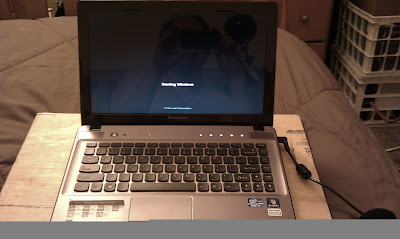I don't know that I agree 100% with this assessment, but I can say that I agree at least 80% with it. The new form factors of laptops, netbooks, tablets, game systems and smartphones are doing most of what the desktop was doing. You want to browse and write something at the desk or do you want to do it on the couch in front of the TV? (The TV has it's own set of computing additions, as I've covered previously, so I won't go in depth here. Except to say that a friend has a Samsung Smart TV, and my goodness, what a sexy bitch it is.)
Here's the thing: I get my money to buy post-PC gadgets by doing one of few jobs I don't think you can really do without the PC. I am a programmer, and I have two PCs at my desk and three monitors. And I do use them. I have virtual desktops on each computer so I can switch between what I'm seeing on each. If I'm doing web development, I tend to have a web browser with documentation on one, editors on the other, and the page I'm working on at a third. One 13" or less screen isn't going to be able to take the place of 3 21"+ screens.
I like the modularity of desktop machines. You can open them up and tell that this is the power supply, this is the hard drive, this is the motherboard, this is the CD drive, etc. If you know which part I think I touch on how archaic this thought is by my using "CD drive" and not DVD drive, Blu-Ray Drive or Optical Drive. A laptop isn't. If the screen goes, if the drive goes, if the USB port is busted, your only choice is to get a new one. It is, in engineering terms, a black box. You know the outputs, you know the inputs, but you don't have an idea of what's going on inside or how to change or fix it.
 |
| A Black Box |
 |
| Another Black Box |
 |
| Not A Black Box |
But the guys who tell the things how to do what they do will be sitting at a keyboard behind big screens for the foreseeable future.




